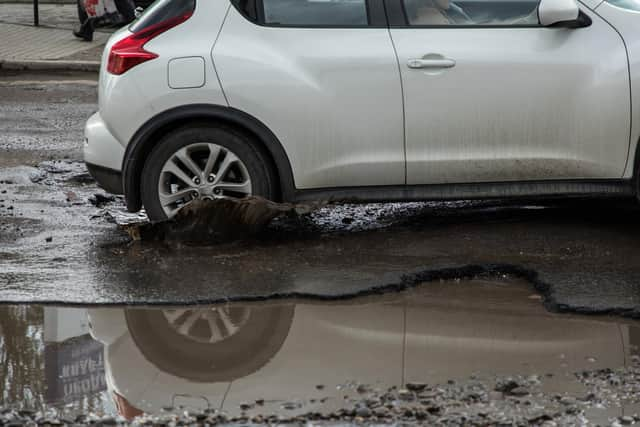Falkirk Council: Warning that roads will see 'managed decline' without more cash spent
and live on Freeview channel 276
This financial year, Falkirk Council’s capital budget allocated £3.5 million for road repairs.
But the council’s director of place services, Malcolm Bennie, told members of Falkirk Council’s executive yesterday (Tuesday) that this was not even enough to “just maintain what we’ve got”.
Advertisement
Hide AdAdvertisement
Hide AdThe need for investment in roads was highlighted in December in a report to the scrutiny committee.


But the latest warning came as members were given an update on capital spending in Falkirk this year.
Mr Bennie told councillors that money could be invested in the road network by using some of the cash from ‘service concessions’ – changes to repayments for the council’s privately financed high schools, which are approaching the end of their contracts.
He warned councillors that they could either use this money to invest in things such as roads or they could use it to bridge the massive gap between spending and income.
Advertisement
Hide AdAdvertisement
Hide AdHe said: “As the scrutiny report highlighted last year, there has been a modest improvement in Falkirk roads in recent years, directly as the result of significant additional investment by the council in its roads.”


This year, he said, that investment has “dropped back to its original level”.
“An investment of £3.6 million is approximately £4 million short of what we need to maintain roads at the existing standard.
“We are now in a position of what we would call ‘managed decline’.”
Advertisement
Hide AdAdvertisement
Hide AdHe added: “That’s why it’s so important for elected members to consider carefully the use of the service concessions because that funding could be used to improve our assets rather than make up budget shortfalls.”
He urged members to keep this in mind as thoughts turn to the council’s budget which will be set in February.
In her report, chief finance gfficer Amanda Templeman highlighted the many financial challenges facing the council’s capital programme, with high interest rates making borrowing much more expensive than in previous years.
Outside factors, including Brexit and the war in the Ukraine, have seen inflation soar, with construction costs particularly affected. The council has also been hit by massive increases in fuel and energy prices.
Advertisement
Hide AdAdvertisement
Hide AdHowever, the SNP administration was keen to emphasise the positives in the capital programme which will see the council spend around £117 million on capital projects this financial year, including £70 million on housing projects.
The spending will include £3.6m on roads; £1.9m on sports and leisure; £2.2m for school extensions, £1m in technology in schools; £6.1m for Denny Eastern Access Road; and £1.8m for Carbon reduction and energy efficiency.
Councillor Gary Bouse said: “That’s £117 million spend in our area at a time when construction inflation is high and interest rates are high. In one of the hardest of times I think our officers have produced an incredible result this year!”
Councillors were reminded, however, that making projections is very difficult in the current climate – for example, supply issues mean that IT equipment might be ordered but not arrive in the same financial year, while costs can rise in between a tender being approved and work being carried out.